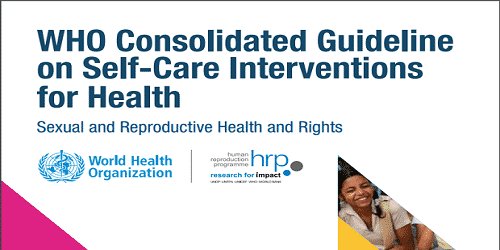The World Health Organization has introduced its first guideline on self-care interventions for health named “WHO Consolidated Guideline on Self-Care Interventions for Health”. Its first volume has focused on sexual and reproductive health and rights.
 WHO has used the following definition of Health care:
WHO has used the following definition of Health care:
“Self-care is the ability of individuals, families and communities to promote health, prevent disease, maintain health, and cope with illness and disability with or without the support of a health- care provider”
Key Highlights of the guideline on global front:
- By 2030, there will be shortage of 18 million health workers.
- Currently, 130 million people are deprived of humanitarian assistance.
- About 400 million people lacked access to the most essential health services.
- At least 100 million people faces poverty due to high costs of health care, as expenses are made out from their own pockets.
About Key interventions:
- Self-sampling for human papillomavirus (HPV) and sexually transmitted infections, self-injectable contraceptives, home-based ovulation predictor kits, human immunodeficiency virus (HIV) self-testing and self-management of medical abortion.
- These guidelines hunt the scientific evidence for health benefits of certain interventions that can be done outside the conventional sector by not replacing high-quality health services.
Additional info:
- The theme of 2019 World Health Assembly (72nd session) was “Universal Health Coverage” focusing strongly on primary health care. It was held in Geneva, Switzerland from 20-28 May 2019.
- On 23rd May 2019, WHO announced the launch of “Self Care Month” during World Health Assembly (WSA) from June 24 to 24 July.
- The International Self Care Day (ISD) is observed annually on July 24.
About WHO:
♦ Establishment: 7 April 1948
♦ Headquarters: Geneva, Switzerland
♦ Head: Tedros Adhanom
AffairsCloud Recommends Oliveboard Mock Test
AffairsCloud Ebook - Support Us to Grow
Govt Jobs by Category
Bank Jobs Notification




